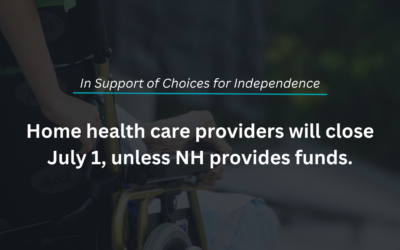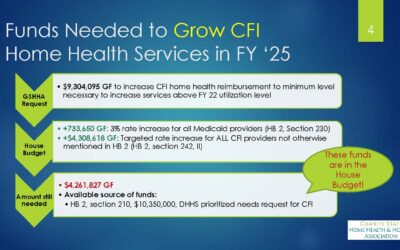Amy Moore, Director of In-Home Care, Testifies for Choices for Independence
Good afternoon, Mr. Chairman and members of the Committee. My name is Amy Moore. I am the Director of Ascentria In-Home Care, which provides personal care services for over 400 people through CFI—the Choices for Independence Program. I also serve on the board of the Home Care, Hospice and Palliative Care Alliance of New Hampshire.
Thousands of Granite Staters depend on the CFI program. These are low-income, medically vulnerable individuals ages 18 to 100 who qualify for nursing homes, but who choose to remain in their own homes. Home and community-based care cost a fraction of what a nursing home does. Unfortunately, these programs have been underfunded for over a decade—so badly that New Hampshire ranks 50th in the amount of Medicaid funding it spends on home and community-based care.
Currently CFI is failing our most vulnerable citizens. Rates are so low that providers cannot hire the workers they need to care for these individuals. Agencies that provide CFI services lose money or struggle to break even. CFI rates do not cover the full cost of training, supervision, caregiving, background checks, TB tests, Workers’ Compensation, health benefits, payroll taxes, communications or billing. Individuals can go to work at Market Basket, McDonalds or Walmart and receive a much higher wage than they would currently receive working for a CFI program. My 13-year-old daughter can make more babysitting for our next door neighbor. We hail these caregivers, these healthcare workers as heroes during this pandemic and yet we won’t pay them a livable wage.
Based on DHHS data, the entire CFI appropriation is rarely spent. This is not because the budget is too large, it’s because agencies can’t provide the services. Funds are being left on the table that could enhance rates and eliminate gaps in care. Without immediate, meaningful changes to the CFI program, many providers will be forced to shutter their programs, leaving NH’s most vulnerable citizens without adequate care. The health care consequences for NH’s vulnerable citizens receiving sporadic, or no CFI care at all can be deadly.
Just as with people with developmental disabilities or mental illness, Granite Staters who need long- term care should be able to remain in their homes and community and not be subject to unwanted and unnecessary institutionalization. New Hampshire is already the second oldest state in the country and our population continues to age. We must strengthen our home and community-based care system NOW.
Thank you for the opportunity to speak.


